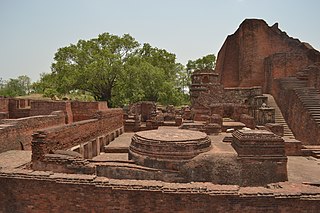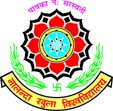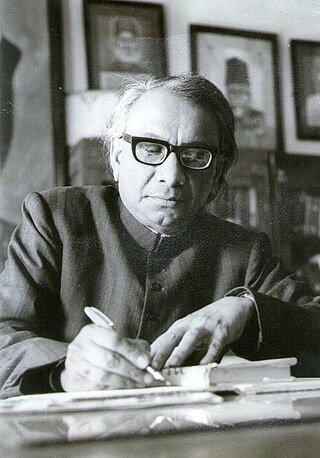
Modern Standard Hindi, commonly referred to as Hindi, is an Indo-Aryan language spoken chiefly in North India, and serves as the lingua franca of the Hindi Belt region encompassing parts of northern, central, eastern, and western India. Hindi has been described as a standardised and Sanskritised register of the Hindustani language, which itself is based primarily on the Khariboli dialect of Delhi and neighbouring areas of North India. Hindi, written in the Devanagari script, is one of the two official languages of the Government of India, along with English. It is an official language in nine states and three union territories and an additional official language in three other states. Hindi is also one of the 22 scheduled languages of the Republic of India.

Urdu is an Indo-Aryan language spoken chiefly in South Asia. It is the national language and lingua franca of Pakistan, where it is also an official language alongside English. In India, Urdu is an Eighth Schedule language whose status and cultural heritage is recognised by the Constitution of India; and it also has an official status in several Indian states. In Nepal, Urdu is a registered regional dialect and in South Africa it is a protected language in the constitution. It is also spoken as a minority language in Afghanistan and Bangladesh, with no official status.

India is a federal union comprising 28 states and 8 union territories, for a total of 36 entities. The states and union territories are further subdivided into districts and smaller administrative divisions.

Bihar is a state in eastern India. It is the third largest state by population, the 12th largest by area, and the 14th largest by GDP in 2021. Bihar borders Uttar Pradesh to its west, Nepal to the north, the northern part of West Bengal to the east, and Jharkhand to the south. The Bihar plain is split by the river Ganges, which flows from west to east.

Magahi, also known as Magadhi, is a Indo-Aryan language spoken in Bihar, Jharkhand and West Bengal states of eastern India, and in the Terai of Nepal. Magadhi Prakrit was the ancestor of Magahi, from which the latter's name derives.
Hussaini is a Village near Kesariya in Kesariya Assembly Constituency of East Champaran District, Bihar state, India.

Jagannath Mishra was an Indian politician who served as Chief Minister of Bihar and as Minister in the Union Cabinet. He was also Member of Parliament, Rajya Sabha between 1988 - 1990 and 1994 - 2000. His involvement was at a high level in the Indian National Congress. He was elected Chief Minister of Bihar three times. After his brother L.N. Mishra's assassination, Jagannath Mishra became Bihar's most powerful Congress leader in the late seventies and eighties. Prior to the emergence of Lalu Prasad Yadav in 1990, Jagannath Mishra was rated as the biggest mass leader in the Congress. He was affectionately called "Doctor Sahib". He was also referred to as "Maulana" Jagannath because of his clout with the Muslims that he had earned by making Urdu the second official language of the state in 1980.

Begusarai District is one of the thirty-eight districts of the Indian state of Bihar. The city of Begusarai is its administrative headquarters and is part of the Munger division.

Bhagalpur district is one of the thirty-eight districts of Bihar state, India. Bhagalpur is the oldest district of Bihar. Bhagalpur city is the administrative headquarters of this district.

Nalanda district is one of the thirty-eight districts of the state of Bihar in India. Bihar Sharif is the administrative headquarters of this district. The districts is home to the ancient Nalanda Mahavihara a UNESCO World Heritage Site. Nalanda is located in the Magadh region of southern Bihar.
Bihari is a demonym given to the inhabitants of the Indian state of Bihar. Bihari people can be separated into three main Indo-Aryan ethnolinguistic groups, Bhojpuris, Maithils and Magadhis. They are also further divided into a variety of hereditary caste groups. In Bihar today, the Bihari identity is seen as secondary to caste/clan, linguistic and religious identity but nonetheless is a subset of the larger Indian identity. Biharis can be found throughout India, and in the neighbouring countries of Nepal, Pakistan and Bangladesh. During the Partition of India in 1947, many Bihari Muslims migrated to East Bengal. Bihari people are also well represented in the Muhajir people of Pakistan because of Partition.

Hakim Syed Zillur Rahman is an Indian scholar of Unani medicine. He founded Ibn Sina Academy of Medieval Medicine and Sciences in 2000. He had earlier served as Professor and chairman, Department of Ilmul Advia at the Ajmal Khan Tibbiya College, Aligarh Muslim University, Aligarh, for over 40 years before retiring as Dean Faculty of Unani Medicine. Presently, he is serving AMU as "Honorary Treasurer". In 2006, the Government of India awarded him the Padma Shri for his contribution to Unani Medicine.

Nalanda Open University (NOU) is a university at Patna in Bihar state, India. It is the only university in Bihar providing education through distance and open education. Nalanda Open University Degree/Diploma /Certificates are eligible for higher studies, public & private sector employment and service promotions. It is recognized by University Grants Commission (UGC). It is a member of Association of Indian Universities which is mainly concerned with the recognition of degrees/diplomas awarded by the Universities in India, which are recognized by the University Grants Commission, New Delhi, and abroad for the purpose of admission to higher degree courses in Indian Universities. It is an open university which means that it follows an open-door academic policy and is open to everyone for admission with minimum requirements.
Bajjika (Western Maithili) is an Indo-Aryan language variety spoken in parts of Bihar, India and in Nepal. It is closely related to Maithili (of which it is often considered a dialect).

Arwal town is the administrative headquarters of Arwal district in Bihar state of India. It was earlier part of Jehanabad district. The district as formed to control the naxalism in the area. District was formed from the area of two near by districts i.e. Jehanabad and Aurangabad. Arwal has a population of 588,000. Arwal, the district headquarters is approximately 80 km south from the state capital Patna. Arwal town is situated on the right side bank of the Sone River, which is a tributary to the Ganges.
Most of the languages of Bihar, the third most populous state of India, belong to the Bihari subgroup of the Indo-Aryan family. Chief among them are Bhojpuri, spoken in the west of the state, Maithili in the north, Magahi in center around capital Patna. Maithili has official recognition under the Eighth Schedule to the Constitution of India. The official language of Bihar is Modern Standard Hindi, with Standard Urdu serving as a second official language in 15 districts.

Abdul Qavi Desnavi was an Indian Urdu language writer, critic, bibliographer and linguist. He wrote many books on Urdu literature. His works included about Maulana Abul Kalam Azad, Mirza Ghalib and Allama Muhammad Iqbal. He was awarded with several awards for his literary works.

Moshtaque Ahmad Noori is an Indian Urdu short story writer and critic. His works include short stories, Ghazals and nazm.
Kalim Aajiz was an Indian writer of Urdu literature and a poet. He was an academic and chairman of the Urdu Advisory Committee of the Government of Bihar. He was a recipient of the fourth highest Indian civilian honour of Padma Shri from the Government of India in 1989.
The Bengali Language Movement is a campaign to preserve Bengali language and Bengalis culture and to oppose anti-Bengali sentiment in India. The movement was started in Manbhum in 1940, ahead of the Partition of India which allocated eastern Bengal to the new nation of Pakistan and led to the relocation of many Bengali communities. In 1947 British India bifurcated into India and Pakistan. The population of the eastern part of Bengal was majority Muslim, and was incorporated into Pakistan. Bengali Hindus in this eastern region migrated to India, principally settling in West Bengal, Chhattisgarh, Dandakaranya and Odisha, Maharashtra, Karnataka. The Movement remains prominent in Assam, Jharkhand, Bihar, Chhattisgarh and Karnataka.














